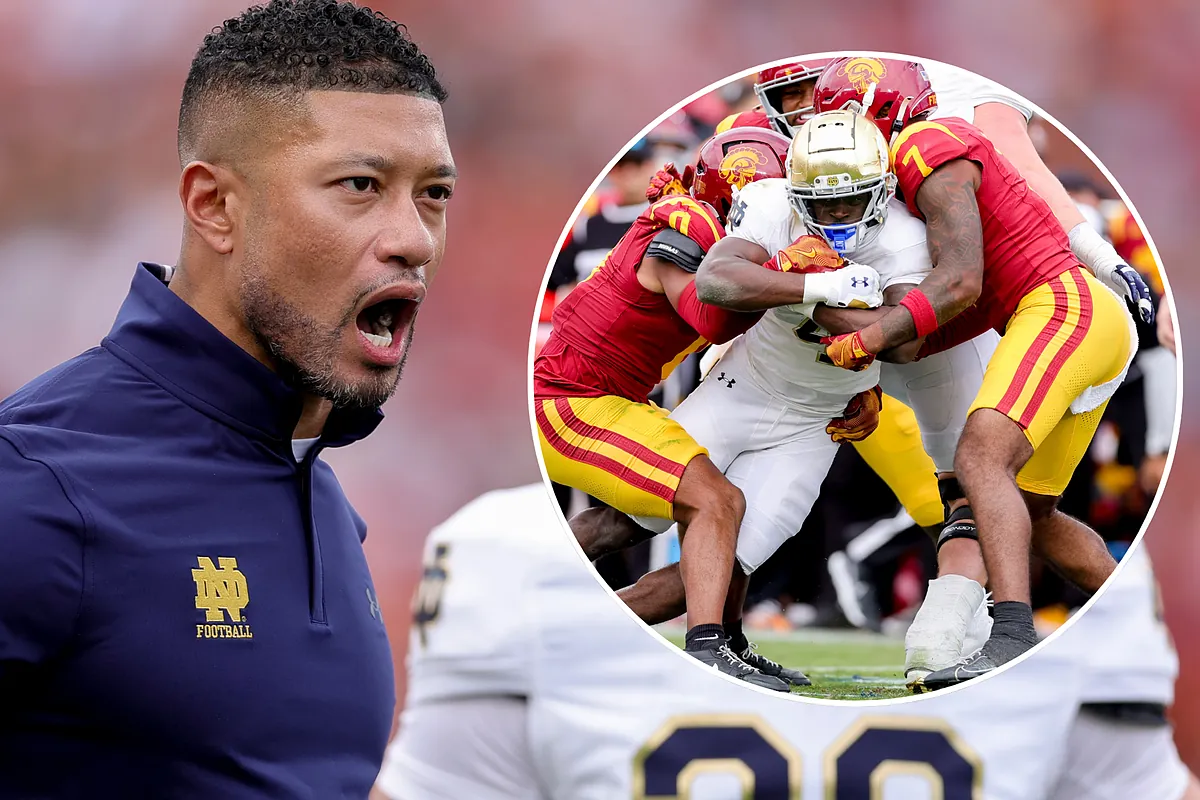Marcus Freeman Wants the Notre Dame-USC Rivalry to Last Forever: “It Don’t Matter When We Play ’Em”
When it comes to college football, few rivalries evoke as much passion, tradition, and raw emotion as the one between Notre Dame and USC. It’s a clash that has spanned generations, defined seasons, and produced some of the most memorable moments in the sport’s storied history. And now, under the watchful eyes of Notre Dame’s head coach Marcus Freeman, the rivalry’s future looks as vibrant and meaningful as ever. Freeman’s simple but profound declaration — “It don’t matter when we play ’em” — encapsulates his deep desire to see this iconic matchup continue indefinitely, regardless of scheduling quirks or college football’s shifting landscape.
The Legacy of Notre Dame-USC: A Rivalry Rooted in History and Tradition
To understand why Marcus Freeman feels so strongly about preserving this rivalry, it’s essential to appreciate its historical context. The Notre Dame-USC rivalry, often referred to as the “Greatest Intersectional Rivalry” in college football, dates back to 1926. Over nearly a century, the Fighting Irish and Trojans have battled on the gridiron more than 90 times, with games frequently carrying national title implications and postseason consequences.
This rivalry is unique not only because of the two teams’ impressive football pedigrees but also because it crosses regional and cultural lines. Notre Dame, the blue blood program from Indiana, represents Midwestern football tradition and a storied Catholic university with a national following. USC, the powerhouse from Los Angeles, embodies West Coast flair, big-city glamour, and a long history of NFL-caliber talent. When these two meet, it’s more than just a game — it’s a cultural event that resonates across the nation.
Marcus Freeman: The New Face of Notre Dame’s Football Legacy
Marcus Freeman assumed the head coaching role at Notre Dame in late 2021 after the departure of Brian Kelly. A former standout linebacker for the Fighting Irish, Freeman’s rapid rise from a top assistant coach to head coach was fueled by his magnetic personality, football intellect, and connection to the program’s rich history. He understands the importance of legacy and the power of tradition, both of which are embodied in the Notre Dame-USC rivalry.
Freeman’s coaching philosophy emphasizes toughness, resilience, and respect for the game’s history. From his very first press conferences, he spoke reverently about the Notre Dame tradition and its place in college football lore. The USC rivalry is not just another game on his schedule; it’s a marquee event that encapsulates the Fighting Irish identity. For Freeman, it symbolizes the kind of competitive spirit and pride that Notre Dame wants to foster in every player.
“It Don’t Matter When We Play ’Em”: A Statement About Timeless Rivalry
One of the challenges college football faces in the modern era is the shifting nature of schedules and conferences. With the rise of the College Football Playoff, expanded conference play, and realignment, some traditional rivalries have faded or become less consistent. The Notre Dame-USC rivalry has encountered such challenges. Unlike many rivalries played annually as part of conference schedules, Notre Dame’s independent status in football and USC’s membership in the Pac-12 (now moving to the Big Ten) mean the game hasn’t been played every single year.
When Marcus Freeman says, “It don’t matter when we play ’em,” he is emphasizing that the rivalry transcends scheduling logistics or calendar concerns. Whether the game is held in early September, late November, or sporadically every few years, the intensity and meaning remain the same. This attitude rejects the notion that rivalries need to be “timed” perfectly on the calendar to matter. For Freeman, what matters is the tradition, the passion, and the stakes whenever these two teams meet.
The Importance of Preserving Rivalries in College Football
In today’s rapidly changing college football landscape, rivalries can sometimes fall victim to conference realignment or playoff-focused scheduling. But coaches like Marcus Freeman understand that rivalries are the heart and soul of the sport. They provide continuity, fan engagement, and an emotional connection that transcends wins and losses.
The Notre Dame-USC rivalry, in particular, serves as a cultural touchstone for alumni, fans, and players. It’s an opportunity to celebrate history and foster a sense of belonging to something bigger than oneself. Freeman’s commitment to ensuring the rivalry lasts “forever” reflects his understanding that maintaining these traditions is critical to Notre Dame’s identity and to college football’s broader cultural fabric.
A Look Back at Memorable Notre Dame-USC Moments
Freeman’s passion for the rivalry is also fueled by the incredible history between the two programs. From the iconic “Game of the Century” in 1966, which ended in a dramatic 51-0 Notre Dame victory, to the thrilling 2005 triple-overtime game, the Notre Dame-USC rivalry has provided countless unforgettable moments. Legendary coaches like Ara Parseghian, Lou Holtz, Pete Carroll, and current coach Lincoln Riley have all added chapters to this saga.
For players, participating in this rivalry is a defining career moment. For fans, it’s a chance to relive decades of highs and lows. Freeman’s desire to keep the rivalry alive ensures future generations will experience that same sense of history and excitement.
Challenges and Opportunities Ahead
While Marcus Freeman’s commitment to the rivalry is clear, maintaining such traditions isn’t without challenges. Conference realignments and television contracts impact scheduling flexibility. Notre Dame’s independent football status makes consistent scheduling more complex, and USC’s move to the Big Ten adds new variables.
Nevertheless, there are opportunities to strengthen the rivalry. Both schools have expressed mutual interest in continuing the matchup long-term, including agreements to extend the series through at least 2030. With strong fan interest and media attention, the rivalry can thrive despite external pressures.
Freeman’s perspective offers a roadmap for success: embrace the rivalry’s history, treat every meeting as a monumental event, and never let scheduling challenges diminish its significance. By doing so, the rivalry can endure — truly lasting forever.
Marcus Freeman’s Vision: Beyond the Game
Freeman’s quote also signals something deeper than just football. For him, the rivalry embodies core values — respect, tradition, perseverance, and community. He aims to instill those values in his players while engaging fans and honoring alumni.
In a sport where change is constant, holding onto such values gives Notre Dame football a stable foundation. Freeman’s leadership is about more than X’s and O’s; it’s about culture-building and legacy preservation.
The Rivalry Lives On
Marcus Freeman’s heartfelt desire for the Notre Dame-USC rivalry to last forever is a reminder of what makes college football so special. It’s a sport deeply rooted in tradition and identity, where certain games transcend the scoreboard to become part of a broader cultural narrative.
“It don’t matter when we play ’em” is more than a statement about scheduling. It’s a declaration that this rivalry will endure through all the changes and challenges facing college football. As long as coaches like Freeman carry the torch, Notre Dame and USC will continue to write new chapters in one of the sport’s greatest stories — a rivalry for the ages that will indeed last forever.



